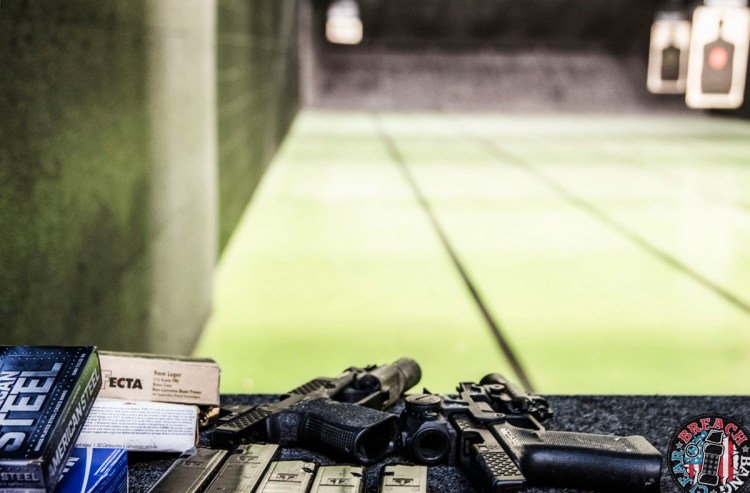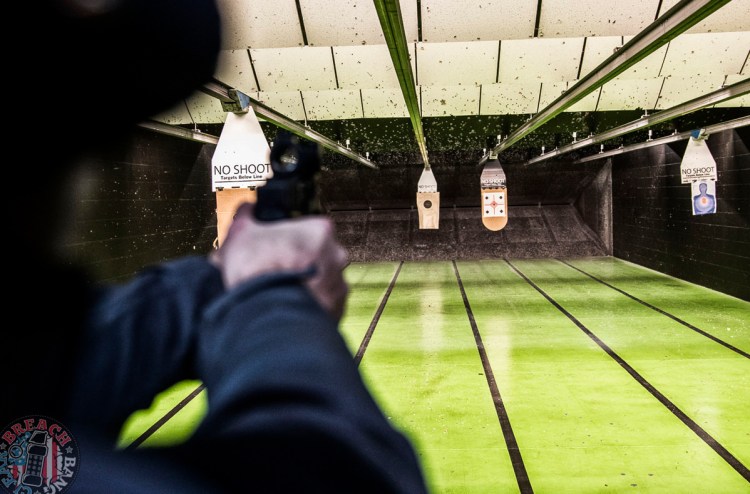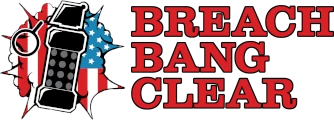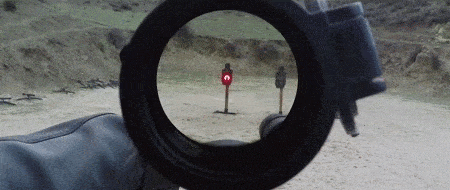We all can’t live near the Weyer Range in Ohio, USSA in Tulsa, or the 88 Tactical facility in Nebraska. So how else can you train? Today we’re gonna chat about limited, short ranges.
But first…a commercial. We gotta eat too y’know.
A perfect range has multiple deep bays with tall berms, capabilities for short and long distances, huge shoothouses with 360 degree shooting capabilities where you can shoot in total darkness or the bright. Throw in a Playboy bunny or two while we’re at it. I’ve shot at plenty of ranges like this (minus the bunnies, unfortunately) but access to these ranges are limited for most of the population.
So what do we do if we can’t? Usually, especially those that live in urban areas, we shoot in cages. That is, indoor ranges. I’ve co-opted the term ‘cages’ from motorcycle riders, who often refer to cars as, ‘cages’. They call them cages because of the relatively restricted movement (and excitement) compared to a motorcycle. And somewhat in the same way, an indoor range is usually limited. Compared to a decent outdoor range, yes indeed, an indoor range is usually shitty.
How and in what manner a given indoor range is limited is going to change from facility to facility—invariably due to construction, liability, and dollars. This doesn’t mean that you can’t get some good training in, just that you have to get a little creative sometimes.

Some ranges don’t allow (you can pick the category as you read down the list):
Rapid fire
Certain calibers
Drawing from a holster
Drawing AIWB
Particular ammunition
Oblique angles
NFA items
Movement
Low-Light
…and to top it all off, it’s rare that you even have an available distance longer than 25m.
Furthermore, just the nature of an indoor range can preclude other things, like the use of a shot clock for picking up shots. I’m a proponent of the shot clock (not everyone is) but it’s kinda hard to use one if there are other people on the range. Even when you’re by yourself, you may have to tune it so it doesn’t inadvertently pick up weird echoes and mark them as fired shots.
Getting to know the owners and managers of an indoor range may open some options for you (like the ability to turn out the lights), but that’s far from guaranteed. But fear not, there are some workarounds. For the sake of this discussion, let’s go with one of the more restricted scenarios—just put everything that was on that list in play.
Work on shooting tiny little holes.
If you can’t move or shoot multiple targets, you can still work on accuracy. Print out some interesting targets. There are any number of drills for this (pistol-training.com has several that will work or can be modified to work). Once you get a good handle on a drill at closer range, simply move it on down the line or switch up your grip to dominant only, non-dominant etc. When I’m in an indoor range, I always like to start and finish with the longest distance available. Any minute muzzle movement is exponentially exacerbated at range. Shooting at 25m+ magnifies any shooter error and forces you to focus on the fundamentals. Grip, breathing, trigger squeeze—you get the idea.

Timed Drills
Now, you might be thinking that I talked about limitations of a shot clock earlier, and indeed I did. While a shot clock may not be able to pick up your split times, with most of them you can still have a randomized start time and set a par time. So, you’d press the start button, wait for the beep, and try to perform an action (shot/reload/shot) within a given time frame before that second beep. Once you’ve accomplished that goal, trim that time down to push yourself.

Have an air holster [Kinda].
If you can’t draw from a holster, you can probably do a pseudo-draw. No, you don’t have to hold your gun at your side (which will probably be against the rules). Hold the pistol in your dominant hand, like you already performed the first part of your draw stroke. Then you can bring your hands together and go from there. It’s not perfect, but it’s a sight better than just picking it off of the bench.

Work on Malfunctions
Though I doubt Will Petty is going to be standing right behind you with the Paw of Doom, you can still randomly insert some dummy rounds into your mags. If you stuff mags before you leave home (even days before) you’ll probably forget that X magazine has a dummy round as its third. Or alternatively, you can bring someone with you to load your mags. It’s also a good way to see if you’re anticipating your shots.
Reloads
Even if you can’t have a holster, you can probably reload. No, you don’t have to have a full kit on, just some belt pouches or your CCW rig will be just fine. Although yes, I have seen a guy wearing an entire slew of ill-fitting cheap battle rattle at an indoor range before. Don’t be that guy.

Zero Your Guns
Even if you normally zero rifles at 50 or 100m, you can still get pretty close with a 25m range. Your offset will depend on your individual barrel length, load, and height over bore, but the internet is full of those calculations if you can’t do the legwork yourself. Get your rough zero at 25m (or equivalent) and then ensure to confirm at an appropriate range when possible.

⚠️ Some hyperlinks in this article may contain affiliate links. If you use them to make a purchase, we will receive a small commission at no additional cost to you. It’s just one way to Back the Bang. #backthebang
Action Shooting [Maybe]
Many indoor ranges have shooting leagues. They vary from USPSA, IDPA, bowling pin shoots, and in-house games (usually depends on the facilities). No, the stages aren’t going to be the same as if it were outside in a deep bay, but you can still get some work in.

Do More Stuff at Home
If you’re limited at the range, your homework load increases. Draws, dryfiring, reloads, et al can be performed in the comfort of your living room. It’s not perfect, but it should tide you over until you can get out to a good range.
For those that shoot regularly in cages, chime in with your best practices.
-DFM








you can try “moving targets” by having the target move towards you as you shoot assuming they have electronic controls.
Good time to practice with your handheld flashlight. There are some fun targets (billiards, balloons, slot machine, etc.) at targetz.com As others have said, most importantly practice with a plan.
Great article, and timely. You see, I just got back from a crappy indoor range a few hours ago. At this range in particular, I had to take a class to “certify” me to be draw qualified, but even with that, I still have to go at a time when the range isn’t “busy” and have to shoot in the last lane on the line. Today, the range was “busy” (although that one lane was available…oh well!), so I did my mod work.
One thing I do is practice some of Claude Werner’s drills, many of which don’t require a draw. I also shot 6 of the 10 CSAT standards that start from a compressed high ready rather than the draw (I could have done a 7th, but it requires a transition from a carbine to pistol, and I didn’t bring a carbine). I also try Dot Torture, as you outlined in the article. The last thing I’ll do is try some of the known drills (5×5, Wizard, etc.) without the draw, just to get the overall “feel” of the drill.
By the way, one other rule you didn’t mention that I’ve run into at places with lower “lines” for the targets is “no head shots”, as aiming higher could hit the lines. That rules out some drills, too!
Great article!
–Rob
https://civiliangunfighter.wordpress.com
I HATE INDOOR RANGES !! TOO MANY IDIOTS, TOO FEW DRILLS.
That’s any range issue. Actually training/drills scares a lot of firearm collectors.
… But remember, even the worst range idiot, still makes it to the range.
Great article! I’d also add that in addition to zeroing an indoor range is a great opportunity to check POA/POI shifts between different types of ammunition (largely pistol only due to the limited range).
Worst range ever was where the wife and I did our CCW qualifications (I think I’ve said this on here before). I shot a guy in the chest thanks to poor range design.
No-fucking-shit I shot a guy in the chest at a local range. Center mass too.
The instructor says “Draw and fire one round”. I do. The round comes back off the damn backstop and hits a guy six or so lanes to my right in his chest. It had to be me, I was the only one firing at the time. Obviously it scares the living hell out of everyone. (OK, scared the living hell out of him, but it scared the rest of us decently well too.)
Fortunately, the bullet was pretty well flattened and only like half of it hit him. Left one shitty looking bruise though, which I know because he immediately yelled something to the effect of “HOLY FUCK! I JUST GOT SHOT!” and took his shirt off to inspect himself. Within seconds of the impact he had a nice purple splotch I would guess to be about 3/4ths the size of the big star on a 24oz Heineken can.
That probably hurt for at least a week. Needless to say, he and his buds packed up and left immediately.
I should have known this might happen because I was wearing shorts and every time someone fired my legs got peppered by bits of lead and shredded copper jacket.
These days, I don’t do shitty ranges. If it looks like crap, I leave. Hell, I don’t even show up. Outdoors with proper berms or I’m off to one of a few spots I know in the mountains where I know that shit won’t happen again.
I train in a cage regularly. A big thing for me is pistoltraining.com drills and personal variations. Additionally to maximize my time I have a plan in advance of what I want to work on. Finally I keep track of my times and what I did well and need to improve.
Having a plan or specific objectives when you go , prevents the tendency to shoot to your strengths(or worse just randomly make it up as you go along )and will maximize your trigger time. Shoot to your weaknesses , or if you are on a team/group shoot, use the same principle, except have each member bring his own card and either draw card for group to follow, or swap cards and shoot to another members card objectives.The latter takes the familiarity out of the picture…you can shoot to another’s weakness, adds the element of the unexpected, and allows you to give feedback to the card owner(nothing works like peer to peer sometimes in a team atmosphere), and just maybe discover a weak spot you hadn’t realized you had before. If you are not shooting to a set of objectives, improvement will be long in coming.Damn, I was just gonna reinforce your mention of drills…not write a novel.
That looks like a very nice range,not a shitty one, love the bright floor
As far as indoor ranges go, that one is pretty nice.
Good stuff
Wow, solid article. Nice photos.
I’m going to go grab that pistol orbital sheet and give that a try.
Weak hand shooting.
You might not be able to so a lot of one-handed manipulation, but you can at least shoot with your weak hand.
How about strong hand/non-dominant eye?
Yessir, that definitely was an oversight on my part. Spending time on in an indoor range is part of how I overcame some accommodative dysfunction (basically eye over-focusing) issues. I’ll add something here shortly. Much appreciated